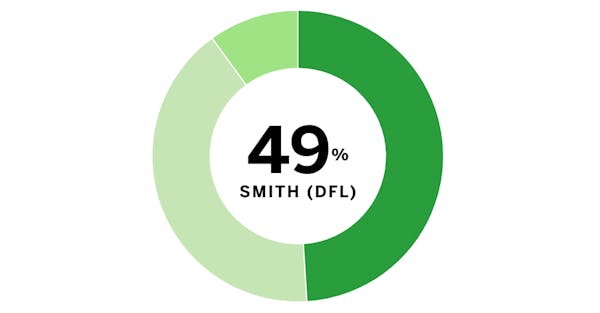A majority of likely Minnesota voters want the U.S. Senate to wait until after the Nov. 3 election to fill the Supreme Court vacancy left by the death of Justice Ruth Bader Ginsburg, results of a new Star Tribune/MPR News/KARE 11 Minnesota Poll show.
Just 39% of those polled said the U.S. Senate should take up the nominee ahead of the election, while 55% said lawmakers should wait. Another 6% said they were unsure.
The death of the 87-year-old justice, just six weeks ahead of the election, has rocked the nation and the presidential race, sparking a heated partisan battle over a rare vacancy on the nation's highest court. President Donald Trump on Saturday nominated Judge Amy Coney Barrett, widely seen as a reliable conservative in the mold of the late Justice Antonin Scalia, for whom she clerked.
Republicans, who hold a majority in the U.S. Senate, have pledged to hold a vote in the coming weeks, over the objection of Senate Democrats who say the next president should get to fill the lifetime appointment. Trump has stated his preference that the Senate vote before Nov. 3 because a full nine-member court might be needed to decide cases challenging the election results.
Minnesota voters also appear split along party lines. The poll found 95% of those planning to back Democratic nominee Joe Biden oppose an immediate vote on the vacancy, while 87% of Trump's supporters want to see a justice confirmed ahead of the election.
Taken together, the findings suggest that the GOP's quick move to confirm a new justice ahead of the election could be politically unpopular in Minnesota, a state Trump has vowed to win after a narrow 2016 loss.
Biden supporter Dana Fierce said Republicans are "doing a disservice to the country" by expediting the process to replace Ginsburg, a champion of women's rights, with a conservative nominee so close to the election. The 39-year-old St. Louis Park Democrat said she's especially concerned with how a conservative court will rule on abortion and other human rights issues in the years ahead.
"On top of the sadness of losing a phenomenal woman, now we have to deal with the Supreme Court issue weeks before the election," she said. "The timing of it just is awful."
For Jeffrey Priest, a political independent, the decision on confirmation comes down to principles. He disagreed with Republicans' decision in 2016 to block a vote on Merrick Garland, President Obama's pick to replace Scalia. Priest said Trump and Republicans are right to proceed with the nomination and confirmation in the current environment.
"If you're a sitting president and a spot becomes available, you should nominate someone and the Senate should vote for them," he said.
Priest said he liked the balance of the court in recent years, with four liberals, four conservatives and a swing vote expected in key cases. But the Cottage Grove resident, who works in the outdoor sports industry, also wants to see the court positioned to uphold Second Amendment gun ownership rights.
The poll found that a confirmation vote ahead of the election is opposed by a plurality of voters in most demographic slices. Influential voter groups, including independents, women and college graduates, also are opposed by broad margins. In the suburbs, voters narrowly prefer a delay, with a 47 to 43% split. One in 10 suburban voters remain undecided.
Only Republicans and voters living in northern Minnesota prefer a vote before the election. Voters in southern Minnesota and those without college degrees are evenly divided.
While at least half of voters in all age groups said the U.S. Senate should wait, young voters were most likely to oppose a quick confirmation. Roughly seven in 10 voters age 18-34 want the process to be delayed until after the election.
The poll's findings are based on interviews with 800 likely Minnesota voters between Sept. 21 and Sept. 23, days after Ginsburg's death. The poll's margin of error is plus or minus 3.5 percentage points.
Past polling suggests that many Minnesotans have shifted their views since the 2016 controversy. In April 2016, 56% of Minnesota voters, including 85% of Democrats, said they wanted the Republican-controlled Senate to hold hearings and a vote on Garland. At the time, just 34% of voters statewide wanted lawmakers to wait and allow the next president to make the appointment.
Torey Van Oot • 651-925-5049





